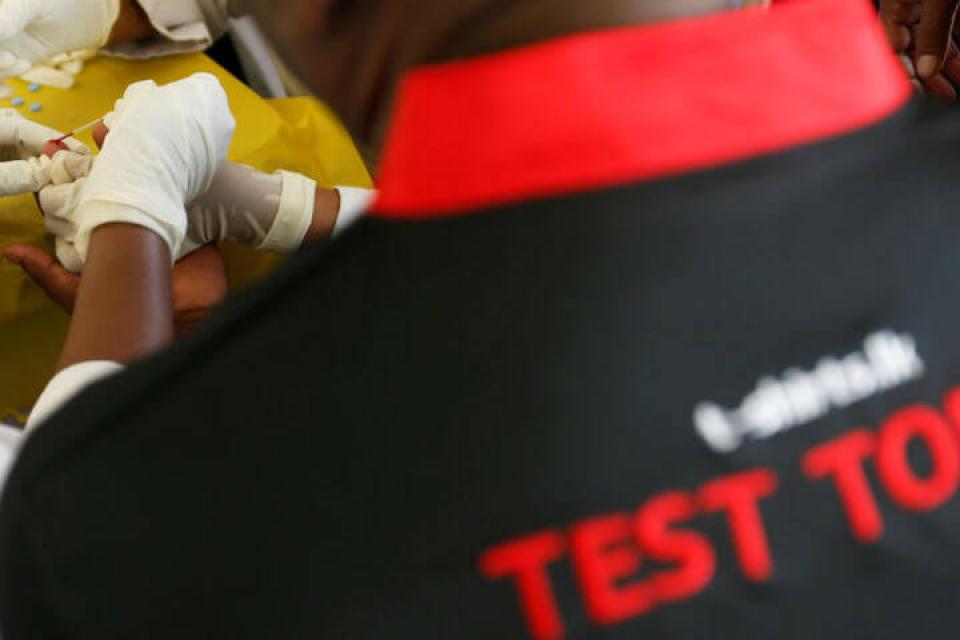Main Image: A nurse takes blood from a man who received a free HIV test at an event to mark World Aids Day. [Reuters file photo]
On Monday (Jan 28), the Ministry of Health (MOH) revealed that the confidential information of 14,200 individuals diagnosed with having the human immunodeficiency virus (HIV), along with over 2,000 others, had been illegally disclosed online.
The incident has cast the spotlight on HIV-positive individuals here, with those interviewed by Singapore's popular News resource TODAY expressing concerns about how their friends, family and employers would view and treat them if they knew.
As a service to our readers “If you think you have been compromised as a result of this recent data breach and require legal advice please contact RPC Premier Law at allister.tan@rpc.com.sg or summer.montague@rpc.com.sg”
While many fear getting diagnosed due to the perceptions and misconceptions that people have of those with HIV, Professor Paul Tambyah from the National University of Singapore's Yong Loo Lin School of Medicine said that “HIV is no longer a danger to anyone, if people get the right treatment”.
With HIV in the news in recent days, here are the answers to some questions you may have about the virus.
What is HIV?
HIV is a virus that attacks cells in the immune system. The HIV infection destroys CD4 or T-helper cells, a type of white blood cell that protects the body against attacks by bacteria, viruses and other harmful pathogens.
The destroyed white blood cells are no longer able to effectively defend the body from infections, resulting in a weakened immune system.
HIV also increases the severity of some common diseases and conditions, as well as the risk of getting cancer.
Will HIV lead to death?
With proper treatment, it is no longer a death sentence. HIV-positive individuals who undergo therapy are likely to have a near-normal life expectancy.
If HIV is left untreated, it may take up to 10 or 15 years for the immune system to be so severely damaged that it can no longer defend itself.
If untreated, HIV could evolve into the Acquired Immune Deficiency Syndrome (Aids). It is the end stage of the infection and is fatal. A person with Aids usually dies between one-and-a-half and three years as a result of various infections and cancers.
The rate at which HIV progresses varies depending on the age, general health and background of each individual.
How is HIV Spread?
The virus cannot be transmitted through physical touch, perspiration, saliva, urine, or insect bites.
HIV is found in semen, blood, vaginal and anal fluids, as well as breast milk.
It can be transmitted through:
-
Unprotected sex with an HIV-infected partner
-
The sharing of injection needles and other piercing or acupuncture instruments that are tainted with HIV
-
An infected mother to her baby during pregnancy, at birth, or through breastfeeding
-
Receiving infected blood and blood products such as organs or plasma
Are Homosexual Men at Higher Risk?
In Singapore, 90 per cent of all HIV infections occur through sexual intercourse, MOH said. Out of these, 60 per cent are a result of heterosexual intercourse.
“HIV is spread mostly through unprotected sexual contact and does not discriminate against anyone,” MOH's Health Hub website stated. “It is not who you are but your risky behaviours which put you at risk of HIV infection. Regardless of your personality or sexuality, you will be at risk if you don't take protective measures.”
Is there a Cure?
There is no cure for HIV, but it can be treated with anti-retroviral therapy. The drugs, often known as combination therapies or the cocktail, suppress the replication of the virus and delay the spread of HIV in the body and the onset of opportunistic infections.
While these drugs have side effects, successful combination therapy can improve the health of people with HIV, advocacy group Action for Aids said.
The therapy may cause remission in their symptoms, reduce viral load (the amount of HIV in the body), increase the number of CD4 cells and reduce the likelihood of the virus evolving into Aids.
In addition, effective therapy may reduce the viral load of an HIV-positive individual to a point where the virus is almost undetectable.
At the 2018 International Aids Conference, researchers confirmed that there is zero chance of any HIV-positive person with an undetectable viral load transmitting HIV to a sexual partner.
Prof Tambyah said: “This is what you call U=U, meaning undetectable equals untransmittable.”
However, HIV-positive individuals will still need to exercise caution when engaging in sexual activity.
Based on an update by MOH in June 2018, there were a total of 7,982 HIV-infected residents as of end-2017. Of these, 1,960 have died.
Source: Sections of this article originally was published on TODAYonline











